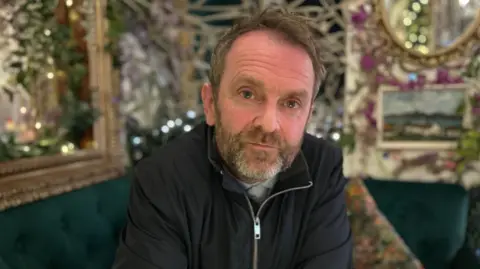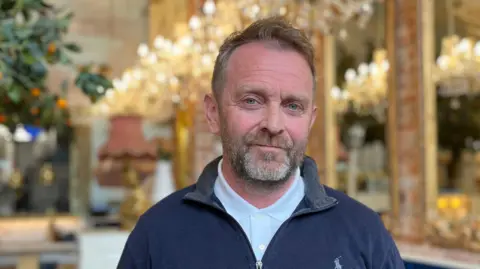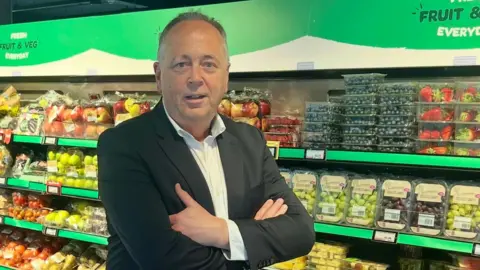Tax and wage hikes 'to cost us £270,000 per year'
 BBC
BBCA restaurant owner has said he will have to find an extra £270,000 this year to cover forthcoming tax rises and increased staffing costs.
Eamon McCusker employs 116 staff across three sites in Belfast - two Chubby Cherub restaurants and AMPM in Upper Arthur Street.
Like most employers in Northern Ireland, he faces a rise in National Insurance bills, a hike in minimum wage levels and an increase in business rates from April.
He said the additional costs have left the hospitality industry facing "really tough decisions".
The restauranteur said businesses like his would have to either raise their prices, cut their opening hours, forego investment or a combination of all three.
"It equates to us having to find an additional £270,000 a year - just to stay static," he told the Good Morning Ulster programme.
"That's with the caveat that there are no supplier increases - which of course there will be."
Chancellor Rachel Reeves announced the National Insurance hike in her last budget, saying the government needed to raise money to secure public finances.
National Insurance contributions help to fund the NHS and pay the UK's benefits bill, including the cost of state pensions.
The contributions are paid by both employers and their staff, but in April it is only employers' National Insurance contributions that will rise - from 13.8% to 15%.
At the same time. the minimum wage for workers aged over 21 will rise from £11.44 to £12.21, with apprentices and 18 to 20-year-olds also seeing an increase.
Business organisations have warned the changes could lead to job losses as employers cut back on staff costs in order to manage their bills.
Some pharmacies in Northern Ireland have appealed to the government for help covering the costs.
Closed restaurants and a 'soulless city'

Mr McCusker has run AMPM for the past 23 years but said the rising costs of running a restaurant have made it a tough trade in which to make money.
"There's kind of an assumption made within our industry that because you're busy, you're profitable. That is actually not true," he said.
"Viable businesses are going to have to close if they do not focus on profitability."
The restaurateur explained it was a difficult time to consider raising the prices that they charge customers because "the affordability just isn't there".
He said venues risk "pricing ourselves out of the market" if they charge too much when people are still struggling with the cost of living.
He added the one thing restaurants can control is their opening hours - only operating at profitable times - but this also can have negative consequences.
"Industry colleagues are going to close Mondays, Tuesdays and Wednesdays," he said.
"So what you'll be left with is a soulless city, a soulless hospitality industry, a reduction in tourism and you will have the inability to grow."
He argued that the cost rises were "reductive policies" which stifled progress.
"They are policies that are actually going to force people like me to basically hold off on investment, not only just physically on capital spend, but also in training and creating a better product and a better service and investing in your people."
Shop owner has to find '£800,000 extra this year'
 Peter McBride
Peter McBrideThe rising cost of doing business is also hitting retailers hard.
Shop owner Peter McBride estimates his staff costs will rise by about £800,000 this year.
"It's just really, really hard to sustain," he said.
He has been in the industry for 37 years, having bought the convenience store he worked part-time in as a student in 1988.
He now owns 16 Spar shops, mainly across counties Tyrone and Fermanagh, and in total he employs 540 staff.
Mr McBride said he was not overly concerned by the rise in the minimum wage as that is a hike they expect every year.
"You need to pay fair wages and get fair work," he said.
"The biggest issue is generally with the National Insurance because not only did the government increase the rate that you pay it at, they also decreased the threshold."
At the moment businesses pay National Insurance on all employees' earnings above £9,100 a year, but in April that threshold will fall to £5,000.
"With 540 staff across the group, it's coming in around a 10% increase which is running at £800,000 extra this year," Mr McBride said.
"Another way of putting it is it's £15,000 per week and that's massive for what's really still a local convenience store business."
'Moratorium on new recruits'
He said his suppliers were facing the same dramatic increase in staff costs and he has "no doubt" the changes will reduce employment levels across the industry.
"In terms of hiring, we certainly have a moratorium on new recruits, except where absolutely vital for the running of the business."
In addition to running his own firm, Mr McBride is president of the business lobby group, Retail NI.
It has described April's triple whammy of cost hikes as a "perfect storm".
It surveyed more than 400 businesses about the likely impact of the changes.
Some 86% of those who responded to the survey said their expansion plans would be cancelled, including recruitment of new workers.
Almost three quarters (74%) indicated they planned to cut existing staff and reduce the working hours of their remaining employees.
For some, it could be the final straw
Analysis by Clodagh Rice, BBC News NI business correspondent:
We have known these increases have been coming since last year's Budget, but what is only becoming clearer as we edge closer to April is how employers will react.
They face difficult decisions - to cut jobs or staff hours? To put prices up? To put investment plans on hold?
While businesses are resilient and will work to find a solution, the impact of pausing or cancelling expansion plans will restrict economic growth.
The timing of the increases will also be felt sharply by sectors still facing soaring food and energy costs, higher interest rates, as well as those still recovering from the pandemic.
For some, it could be the final straw which makes them decide to close altogether.
